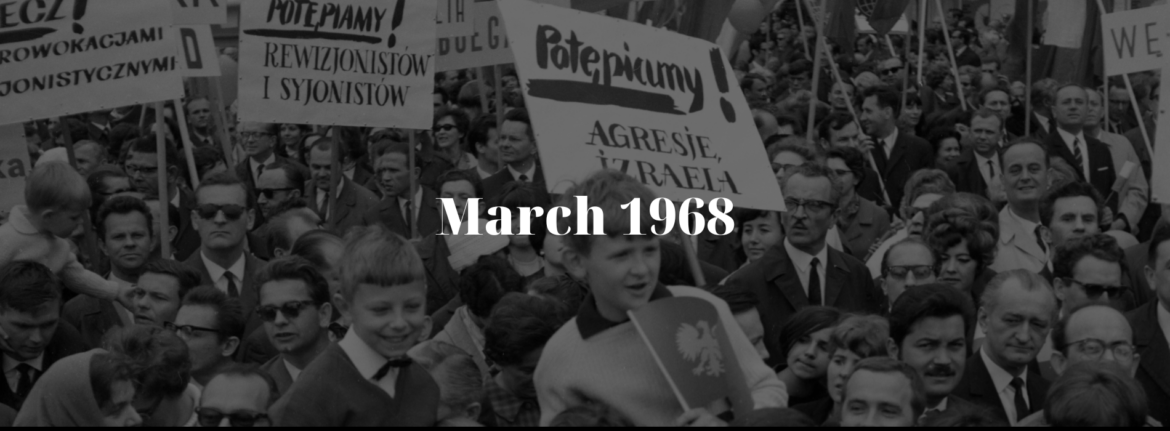The events of March 1968 (Marzec 1968) in Poland were a pivotal moment in the country’s history, marking the intersection of political repression, student protests, and an anti-Semitic campaign that would leave a deep scar on Polish society. What began as a demonstration for cultural freedom quickly escalated into a nationwide crisis, revealing the extent of government authoritarianism under the Polish People’s Republic (PRL).
The Spark: Theatre and the Suppression of Culture
The immediate trigger for the March 1968 protests was the government’s censorship of the play Dziady by Adam Mickiewicz. This classic work, laden with themes of freedom and resistance against tyranny, had been revived at the National Theatre in Warsaw. Directed by Kazimierz Dejmek, the production resonated with contemporary audiences, drawing parallels between Mickiewicz’s critique of Russian imperialism and the realities of Soviet influence over Poland.
The authorities deemed the play subversive, and on 30 January 1968, its performances were banned. The final staging on 30 January turned into a spontaneous protest, with audience members shouting slogans condemning censorship and the Soviet Union. This sparked further demonstrations, particularly among students, who saw the government’s actions as part of a broader assault on intellectual and cultural freedom.
Student Protests and Escalation
On 8 March 1968, students at the University of Warsaw organised a rally to protest the expulsion of their peers, Adam Michnik and Henryk Szlajfer, who had been involved in earlier demonstrations. The rally quickly escalated into a broader critique of the regime, with participants demanding an end to censorship, greater civil liberties, and the withdrawal of Soviet influence from Poland.
The government responded with force. Police and ZOMO (paramilitary units) brutally dispersed the protesters, using batons and arresting hundreds. The violence spread to other cities, including Kraków, Gdańsk, Wrocław, and Poznań, as students across the country joined the protests.
The Anti-Semitic Campaign
While the student protests initially focused on cultural and political freedom, the government exploited the unrest to launch an anti-Semitic campaign. Władysław Gomułka, then First Secretary of the Polish United Workers’ Party (PZPR), framed the protests as part of a „Zionist conspiracy” orchestrated by foreign powers.
This rhetoric was part of a broader political struggle within the PZPR. Following the Six-Day War in 1967, Poland had severed diplomatic ties with Israel, and anti-Zionist propaganda became a tool for consolidating power. In practice, this campaign targeted Polish citizens of Jewish descent, accusing them of disloyalty and labelling them as enemies of the state.
The anti-Semitic purge led to the dismissal of thousands of Jewish individuals from government positions, universities, and other institutions. Many were forced to emigrate, often after being stripped of their citizenship. Between 1968 and 1972, approximately 13,000 Polish Jews left the country, marking the final blow to a community that had already been devastated by the Holocaust.
Societal Divisions and State Propaganda
The government used state-controlled media to demonise the protesters, portraying them as „spoiled youth” manipulated by Western powers and Zionist agents. This propaganda aimed to sow division between students and workers, presenting the former as disconnected from the realities of everyday life under socialism.
While workers initially remained passive or hostile to the protests, many began to sympathise with the students as the government’s violent crackdown became more apparent. Nevertheless, the regime successfully exploited societal divisions to isolate the movement and prevent broader solidarity.
Consequences and Legacy
The events of March 1968 had far-reaching consequences for Polish society. For the student movement, the protests ended in defeat. Many activists were arrested, expelled from universities, or silenced through intimidation. The government tightened its grip on intellectual life, purging dissenting voices from academia, culture, and the media.
For Poland’s Jewish community, March 1968 marked a tragic chapter in their history. The emigration of thousands of Jews not only depleted the country of significant cultural and intellectual talent but also left a lasting wound in Polish-Jewish relations.
Politically, the events exposed the contradictions of the PRL. The regime claimed to represent the working class, yet it relied on repression and propaganda to maintain control. The anti-Semitic campaign, driven by political opportunism, revealed the extent to which the leadership would exploit social divisions to preserve its power.
Reflections on Freedom and Repression
In the decades since 1968, the events of that turbulent March have been the subject of extensive reflection and debate. For many, it represents a critical moment in the struggle for freedom and human rights in Poland, foreshadowing the rise of movements like Solidarność in the 1980s.
March 1968 also serves as a reminder of the dangers of authoritarianism and the consequences of scapegoating minorities during times of political crisis. It underscores the importance of protecting cultural and intellectual freedom as essential pillars of a just society.
Today, the legacy of March 1968 continues to resonate, offering lessons about the resilience of those who dared to challenge oppression and the costs of silence in the face of injustice.
